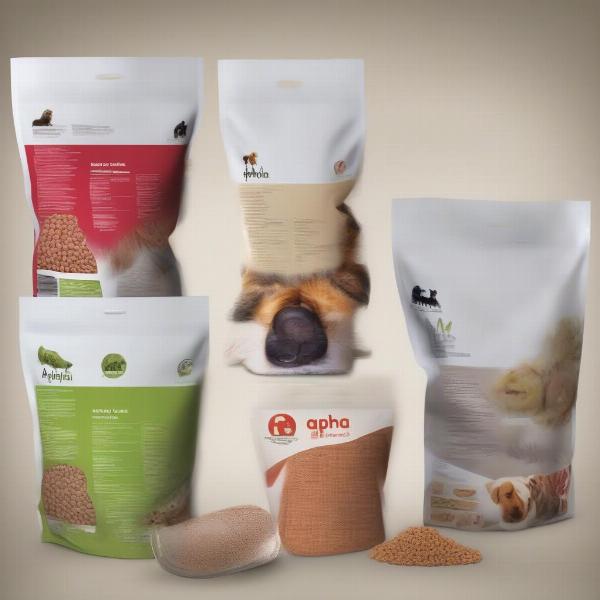Alpha dog food has become a popular search term for dog owners looking to provide their furry companions with the best nutrition. But what exactly does “alpha” signify in the world of dog food, and how can you navigate the various options available to select the ideal diet for your dog’s specific needs? This guide will explore the world of alpha dog food, covering everything from understanding the term to choosing the right formula and addressing potential concerns.
Decoding “Alpha” in Dog Food
 Alpha Dog Food Packaging Examples
Alpha Dog Food Packaging Examples
The term “alpha” in dog food doesn’t have a standardized definition. It’s often used in marketing to convey a sense of premium quality, high protein content, and a focus on natural ingredients. Some brands might use “alpha” to suggest their food is suitable for dominant or active dogs. However, it’s crucial to look beyond marketing buzzwords and delve into the actual ingredients and nutritional profile of the food. Don’t assume that “alpha” automatically equates to superior quality. Always check the ingredient list, guaranteed analysis, and AAFCO statement to ensure the food meets your dog’s specific requirements.
Choosing the Right Alpha Dog Food
Selecting the best alpha dog food involves considering your dog’s age, breed, activity level, and any health conditions. Puppies, adult dogs, and senior dogs have different nutritional needs. Similarly, a highly active working dog will require a higher calorie and protein diet than a less active lap dog. Look for alpha spirit dog food that cater to your dog’s specific life stage and activity level. If your dog has allergies or sensitivities, opt for alpha sensitive dog food formulated with limited ingredients or hypoallergenic protein sources.
What are the key factors to consider when choosing alpha dog food?
Consider your dog’s age, breed, activity level, and any health conditions.
Is alpha dog food suitable for all breeds?
Not all “alpha” labeled foods are created equal. It’s important to check the ingredients and nutritional information to ensure it meets your dog’s specific needs.
What if my dog has food allergies?
Choose hypoallergenic formulas or those with limited ingredients, like alpha sensitive dog food, for dogs with allergies or sensitivities.
Addressing Potential Concerns about Alpha Dog Food
Some dog owners are concerned about the high protein content often associated with alpha dog foods. While protein is essential for muscle development and overall health, excessively high levels can be problematic for certain dogs, especially those with kidney issues. Always consult your veterinarian before switching your dog to a high-protein diet. Another concern is the potential for marketing hype surrounding the term “alpha.” Don’t be swayed solely by marketing claims. Focus on the nutritional content and ingredients to determine if the food truly aligns with your dog’s needs. A balanced diet is key, and even the best alpha dog food might not be suitable for every dog.
Dr. Emily Carter, a veterinary nutritionist, advises, “While ‘alpha’ might sound appealing, it’s crucial to remember that every dog is an individual. The best dog food is one that meets your dog’s specific nutritional needs, regardless of marketing labels.”
Conclusion
Choosing the right alpha dog food requires careful consideration of your dog’s individual needs and a thorough understanding of the ingredients and nutritional profile. Don’t be fooled by marketing tactics; prioritize your dog’s health and well-being by selecting a food that provides balanced nutrition and supports their overall health. Remember to consult your veterinarian if you have any concerns or questions about your dog’s diet.
FAQ
- What does “alpha” mean in dog food? “Alpha” is a marketing term often used to suggest premium quality and high protein content, but it has no standardized definition.
- Is alpha dog food good for puppies? Not all alpha dog foods are suitable for puppies. Look for formulas specifically designed for puppy growth and development.
- Can senior dogs eat alpha dog food? Senior dogs might benefit from different nutritional profiles. Consult your veterinarian for recommendations.
- What if my dog doesn’t like alpha dog food? Try gradually transitioning to the new food by mixing it with their old food.
- Where can I buy alpha dog food? Alpha dog food can be purchased from pet stores, online retailers, and sometimes directly from the manufacturer.
- How much alpha dog food should I feed my dog? Follow the feeding guidelines on the packaging and adjust based on your dog’s individual needs and activity level.
- What are the signs of a food allergy in dogs? Signs of a food allergy can include itching, skin irritation, digestive upset, and ear infections.
ILM Dog is a leading international website dedicated to providing dog owners with reliable and practical information on all aspects of dog care and wellbeing. From breed selection and puppy care to senior dog health and training, ILM Dog offers a wealth of expert advice. We also provide insightful reviews on dog products and accessories. Learn more about dog nutrition, including information on linseed oil for dogs, or discover the differences between coyotes vs dogs. For inquiries, reach us at [email protected] or call +44 20-3965-8624.